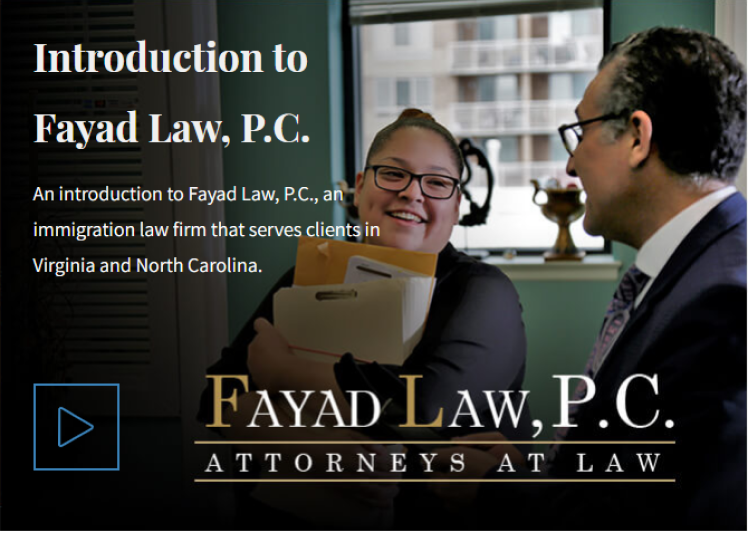Parent-Immigrant Visa Attorneys
Offering Guidance for Families in USA and Around the World
One of the various types of family immigration occurs when a foreign-national parent is able to obtain a green card (an immigrant visa) based on the fact that his or her son or daughter is a U.S. citizen.
What is an IR-5 Visa?
An IR-5 visa, falls into the category of Immediate Relative Immigrant Visas. This visa allows U.S. citizens to bring foreign-born parents to the United States as permanent residents. There is no annual limit on how many of these types of visas can be issued each year.
In order for a U.S. citizen to sponsor a parent using an IR-5 visa:
- He or she must be at least 21 years of age
- Must maintain his or her principal residence in the U.S. Permanent residents
- Are not allowed to sponsor parents for immigrant visas
At Fayad Law, P.C., we know the importance of family and of being able to reunite with your loved ones. If you are planning to apply for a parent-immigrant visa or to sponsor a parent through this type of visa, we advise you to consult with one of our Virginia immigration attorneys. With the help of an experienced legal professional, you may be able to improve your chances of getting the visa approved or of getting the application process expedited. We are fully aware of all the paperwork that needs to be filed and all the other steps that need to be completed.
Let our immigration law firm provide you and your loved ones with the high-quality legal counsel you need!
What steps do I need to take?
When applying for permanent residence for a parent, the following steps must be carried out, according to U.S. Citizenship and Immigration Services (USCIS):
- You must file Form I-130 (Petition for Alien Relative) and supporting documentation, such as a birth certificate and the petitioner’s proof of citizenship. This information must be filed with USCIS.
- If the parent is already in the U.S., that individual can usually apply to adjust his or her status using Form I-485, which is filed together with Form I-130.
- If you are notified that your petition was approved by USCIS, you will need to complete visa processing with your local U.S. consulate.
- After the parent becomes a permanent resident, he or she is then authorized to work in the United States.
Do not hesitate to turn to our team at Fayad Law for help with your parent-immigration visa petition. We can assist you at one of our two U.S. office locations, which are located in Richmond and Fairfax, Virginia.
Contact Fayad Law, P.C. today so we can help you scheduled an initial consultation with one of our skilled Virginia immigration attorneys!
Introduction To Fayad Law, P.C.

Have questions about your rights? Ready to discuss your
immigration case? Contact Fayad Law, P.C. now.
What Sets Fayad Law, P.C. Apart?

Firsthand Experience
as Immigrants

English, Arabic, French,
Russian, Spanish, and Farsi

Proven Track
Record of Success

Personal, One-on-One
Attention

You Stay Informed
at All Times

We Strive for Client
Satisfaction
FAQs - FREQUENTLY ASKED QUESTIONS
There are dozens of different types of visas available under the provisions of the Immigration and Nationality Act (INA), but they can all be placed in one of two categories: immigrant and nonimmigrant visas. The former is for individuals who are hoping to establish permanent residency with a green card and perhaps even to pursue the path to naturalization and citizenship. The latter is for those who are only planning a temporary visit to the United States, such as for the purpose of conducting business or attending school.
The INA sets limits on the number of people who will be permitted to immigrate to the United States each year using certain types of visas, while other visas are unlimited. Family immigration visas for the immediate relatives of U.S. citizens are available on an unlimited basis, while there are annual quotas set for the relatives of lawful permanent residents and extended family of citizens, with a maximum quota of 480,000. The number of employment immigration visas is limited to 140,000 per year.
Pathways to citizenship include service in the United States military and adoption, but a large percentage of all people who become citizens do so through the process of naturalization. The basic qualifications for naturalization include:
- Living in the U.S. as a permanent resident for 5 years (or 3 years for a spouse of a U.S. citizen)
- Being at least 18 years of age
- Living within the state where you will apply for citizenship for at least 3 months prior to the application date
- Being physically present in this country for at least half of the past 5 years
- Maintaining continuous residence in this country from the date you submit your application for naturalization
- Being able to read, write and speak English
- Have a basic understanding of U.S. government and civics
It is also necessary to supply evidence that you are a person of good moral character and are attached to the principles of the U.S. Constitution. We can assist you with proving these factors, as well as preparing your petition and helping you get ready for the tests.
In June of 2012, the Obama Administration directed the Department of Homeland Security (DHS) to begin applying a policy that is referred to as Deferred Action for Childhood Arrivals (DACA). Under deferred action, DHS is exercising discretion in its execution of the laws concerning deportation and removal of immigrants who are illegally present in the United States. Deferred action is not a change to the existing law, but is instead a change in the way that the law is being applied. You may qualify for relief under DACA if you were younger than 31 years of age on June 15, 2012, came to the U.S. before your 16th birthday, have continuously resided in this country since June 15, 2007 and are either currently in school or have already graduated from high school or earned your general education development (GED) certificate, among other criteria. With deferred action, you may be able to avoid being deported, though it does not grant any change of immigration status.
In its review of immigrant visa petitions, the U.S. Citizenship & Immigration Services (USCIS) weighs factors related to the ties that the prospective immigrant has in the United States and the reasons why he or she wants or needs to come to live in this country. For example, a family immigration petition will not be approved unless the foreign national has immediate relatives such as a spouse, mother or father, child or sibling already living here as a citizen or green card holder. An employment immigration petition is more likely to receive approval if the applicant has a job offer in this country and is coming to fill a position that cannot reasonably be filled from the local labor market. A foreign national who is fleeing persecution in his or her home country may be granted an immigrant visa as a refugee or asylee.
There are many strategies for challenging a removal action. If the proposed deportation is based on a criminal conviction, it may be possible to appeal the conviction in order to have it overturned. Another option is to petition for cancellation of removal, a type of immigration relief which is available to people who are of good moral character and whose deportation would subject a family member who is a citizen or permanent resident to extreme hardship. The key to success in stopping deportation is to take immediate action by hiring a Virginia immigration attorney from our firm as soon as possible. Contact us now at Fayad Law, P.C. for a confidential consultation and to let us get started on your case!
Fayad Law, P.C. maintains offices in Richmond and Fairfax, Virginia. We work with individuals, families, and businesses across the world, providing them with assistance in resolving the legal issues involved with helping their loved ones and employees to immigrate to the United States. We work directly with foreign nationals living abroad, guiding them through the process of obtaining immigrant and nonimmigrant visas for entry to the U.S.
Real Clients, Real Testimonials
Contact Us Today
Have questions about your rights? Ready to discuss your immigration case? Contact Fayad Law, P.C. now.




















